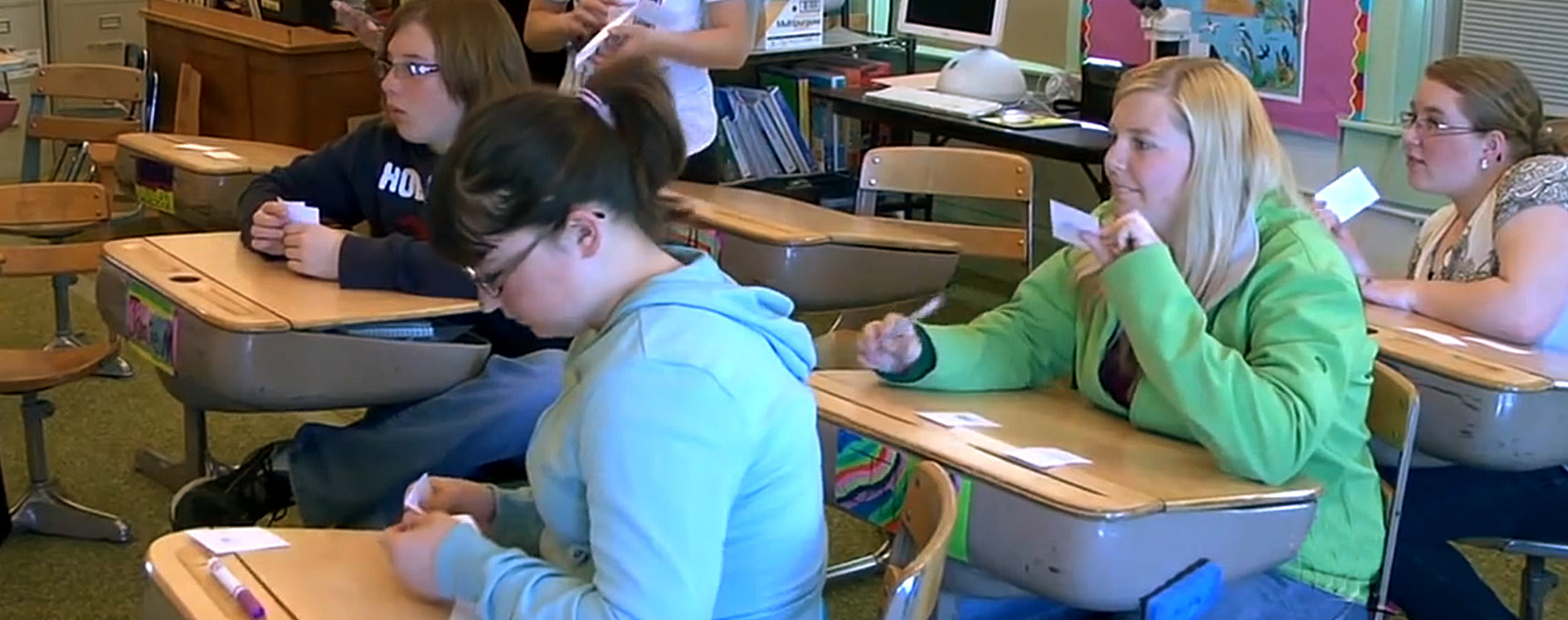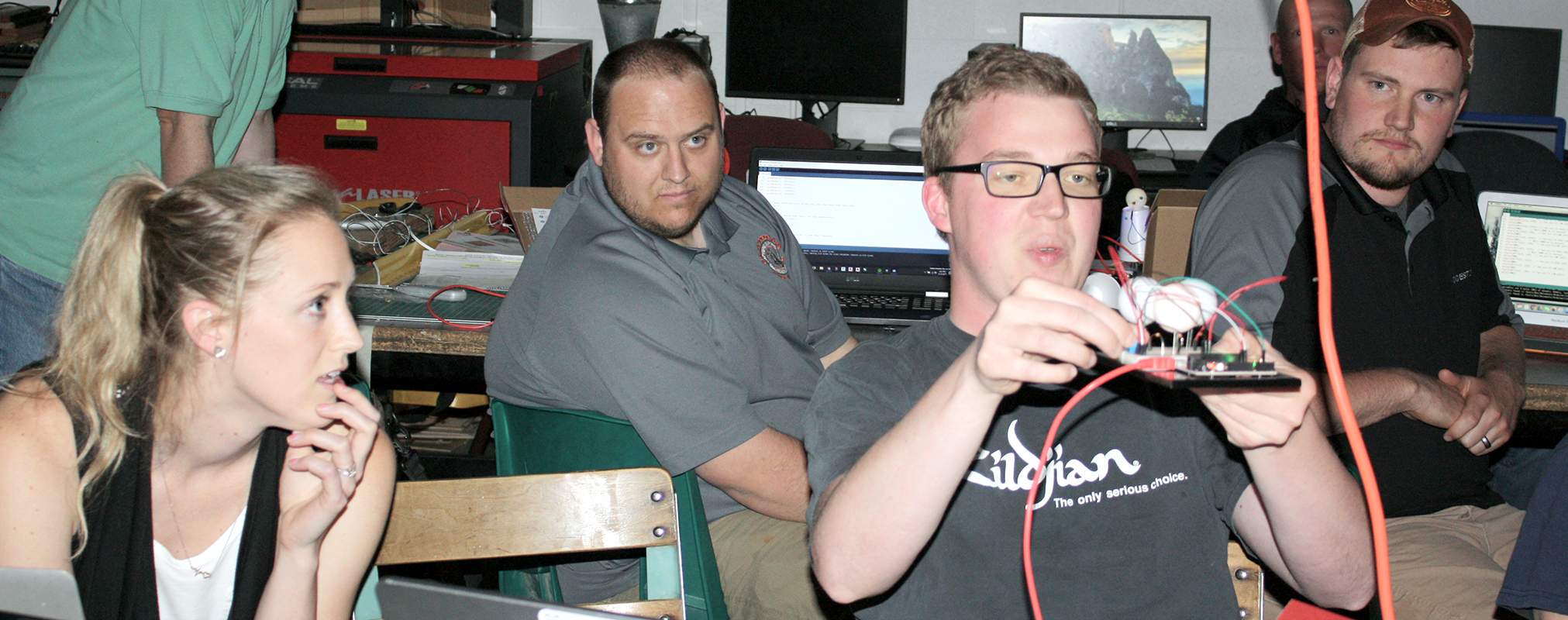Outreach and Engagement
EHHD campus and community involvement


Rural Teaching Colloquium brings together rural district administrators and potential teachers
As part of its efforts to address teacher shortage concerns in rural Montana school districts, Montana State University’s Department of Education brought together rural administrators and education students just completing their student teaching experiences for MSU’s inaugural Rural Teaching Colloquium.
The colloquium held Dec. 14, 2016, included a panel presentation by rural administrators from nearly a dozen northern and eastern Montana rural school districts. Teacher candidates also interviewed with the administrators for teaching positions.
Tena Versland, assistant professor in educational leadership and one of the colloquium’s organizers, said administrators in rural Montana school districts often report that they have difficulties finding teachers interested in coming to their districts, for reasons ranging from low salaries to isolation.
“Superintendents are telling us they don’t get applications for openings, or they have to fill a teaching position with a person who is not a licensed teacher but is willing to take classes to become certified,” she said.
In addition, recent articles in Montana media outlets have reported that teacher shortages in northern Montana have reached “crisis levels” and that universities are not graduating enough teachers to fill all the vacant positions, Versland said.
Tricia Seifert, head of the MSU Department of Education in the College of Education, Health and Human Development, noted that while some other universities in Montana have seen a decline in students majoring in education, MSU has remained relatively steady over the last eight years in teacher education student numbers and is the highest producer of education graduates in Montana.
“Overall enrollment is consistent with 2007, with 932 students enrolled in a teaching major in 2016,” Seifert said. “Elementary education numbers have been steady in the last five years, as well, with about on average 430 majors.”
Read more about rural education.

Science, technology, engineering and math summit held at MSU
A daylong summit on the campus of MSU in August brought together representatives from education, business, after-school providers, government and the larger community to discuss how Montana can build a strong science, technology, engineering and math ecosystem across Big Sky country.
Close to 160 participants explored ways to expand STEM experiences outside the classroom and create a collaborative framework for more high-quality STEM learning for Montana youth. The College of Education, Health and Human Development and the Montana Afterschool Alliance were co-hosts of the event.
The day consisted of speed networking, panel discussions with action tables, a hands-on demonstration with STARBASE Montana and key speakers, including conversations with MSU President Waded Cruzado, state Superintendent of Public Instruction Elsie Arntzen and Lt. Gov. Mike Cooney. One of the highlights of the day was a collaborative activity where teams had to build a free standing tower using pipe cleaners, with challenges along the way. An optional one-hour TechBridge Role Models Matter workshop was offered immediately following the close of the summit.
Jan Lombardi, a founding member of the Montana Afterschool Alliance, which was organized in 2014 with funding from the Charles Stewart Mott Foundation, said there are children in Montana who don’t have the opportunity or support to experience high-quality after-school or summer learning. Today’s youth need to be critical thinkers, and by building knowledge and skills outside of school, children are more college and career ready.
Alison Harmon, dean of the College of Education, Health and Human Development, said that the summit was a critical gathering of individuals whose input is needed to identify state priorities and chart a course for expanding STEM education.
The summit was made possible by a planning grant from STEM Next, a national initiative housed at the University of San Diego designed to prepare more young people for careers in STEM fields, as well as numerous local and state sponsors.

MSU Troops to Teachers regional program receives federal grant to reinstate services

Montana teachers learn to build digital sculptures
Over 20 educators from across Montana were at Bozeman High School’s technology education lab to learn about programming very small computers called arduino that are found in ATM machines, lights in Las Vegas and Disneyland, and in NASA satellites. These technology education, math and science teachers were learning first hand from the education team at SparkFun Electronics how to build digital sculptures using everyday items such as ping pong balls and Styrofoam cups and to write the code to make them light up and make sounds. Brian Huang and Jeff Branson from SparkFun based in Boulder, Colo., said their educational kits teach students at an early age to be comfortable with technology and writing code.
Ashley Brumwell, a math teacher at Bozeman High School and MSU alumna, said she sees herself using these kits in a geometry class and architectural graphics class.
Gilbert Kalonde, assistant professor of technology education and organizer of the workshop, said this is the second year for offering professional development to educators from across Montana. Projects created during the two day workshop were shared with teachers state-wide to use with their students.

MSU student food pantry
The MSU Outreach and Engagement Council, a program designed to bring faculty, staff and students together with local partners to address needs of Montana communities, awarded one of the four grants to the MSU student planned food pantry. Bounty of the Bridgers — also known as BoB — is a food pantry on the MSU campus. Mary Stein, program leader and instructor in the sustainable food and bioenergy systems program, proposed the project.
MSU students in a sustainable food and bioenergy capstone class researched food insecurity on campus and found that 30 percent of respondents reported some degree of food insecurity, defined by the U.S. Department of Agriculture as “not having access to a sufficient supply of nutritious and safe food.”
Using student volunteers from multiple disciplines, the food pantry project strives to educate the campus community about the level of food insecurity at MSU, and has established a “pop-up” campus food pantry that offers shelf-stable food in a non-permanent location. During this first phase, students will analyze who will use the food pantry, which will inform the choice of a permanent location. In phase two, the group seeks to establish a permanent food pantry on campus with hours that complement those of the Gallatin Valley Food Bank, a key partner on the project.
The project hired an AmeriCorps VISTA member, Aubree Pierce, who is coordinating efforts to move the project forward in fall 2017.
Stein wrote that research shows a correlation between food security and academic success, and that assisting MSU students in obtaining safe and healthy food could ultimately affect college retention rates.


Phi U wins first place for their professional outreach project
MSU’s oldest honorary society, Phi Upsilon Omicron (Phi U), was awarded first place for their professional project in a national competition for 2016. The project focused on raising awareness of the number and needs of homeless youth in Bozeman Public Schools. Through showing the movie “American Winter,” a movie about the hardships families faced in the recent recession, and collecting 850 donated items and $216 in cash, members of Phi U felt their project had a definite impact on students and community members who did not realize that 5% of students in Bozeman are homeless.
Chapter President Sierra Smith, a community health major, said they hung posters around campus and in residence halls, placed an ad in the “MSU Exponent,” and sat at a table in the student union to reach out to students.
Smith and fellow Phi U member, Jessica Perrault, a family and consumer sciences major, also stood outside Walmart with empty shopping carts collecting donations. They were amazed at the generosity and caring spirit of the Bozeman community.
In September 2016, Lindsay Stickel, vice-president and family and consumer science education major from Terry, Mont., traveled with faculty advisor, Sandra Osborne, to the national conclave in Oklahoma City to receive the first place award for “Creating Warmth for Our Youth Legacy by Fostering the Light of the Home Tradition.”
“It was empowering to see women in their seventies, eighties, and even nineties attending conclave because of their pride and passion for family and consumer sciences and related fields,” said Stickel. “It was inspiring to reflect on how those women went to college in a time in which women attending universities was still not commonly accepted, and family and consumer sciences and related fields were included in the limited majors they could study.”
Founded in 1917 at MSU, Phi U celebrated its 100th anniversary on campus in July 2017, with a dinner/reception, an open house and tours of Herrick Hall.
EHHD hosts international Education Conference on Learning, Teaching and Student Success
The first International Conference on Learning, Teaching, and Student Success (ICLTSS) was held on the campus of MSU in November 2016 with over 150 educators and other stakeholders from 15 countries attending. According to Dean Alison Harmon, in addition to the College of EHHD being a sponsor, many faculty from the college participated in the event either as attendees or presenters. The three-day conference brought together academic researchers, faculty in higher education, school administrators, educators and students to share research and best practices to bridge organizational and communication gaps between K-12 and higher education and student success.
Several keynote speakers spoke on topics such as creating a school climate where every student graduates, how emotion and sleep affect learning and the brain, and adaptive mindset for student success. The conference is part of the mission of Thomas Lechner, an MSU alumnus whose nonprofit 21st Century Academic Forum works to bring together researchers and educators to help shape educational policy and practices and prepare students for the workforce and the broader world.
Lechner said the theme of the Bozeman conference was “we’re all in this together.” After spending most of his adult life teaching overseas, Lechner returned to Montana and founded the nonprofit organization several years ago. He began having conversations with Kregg Aytes, Dean of the Jake Jabs College of Business and Entrepreneurship, and Dean Harmon about focusing on student success by connecting K-12 education and higher education.
“ICLTSS had a visible impact on attendees,” said Harmon. “Incredible speakers and presenters from many corners of world came together to share research, success strategies, and offer excellent insights into current practices in teaching, learning, and student success.”
She also noted that to have Montana State University host the ICLTSS conference was a great honor and opportunity to showcase the work of MSU faculty for local and international scholars, to share resources, and to learn from each other. 21st Century Academic Forum also hosted conferences in 2016 in other locations, including the University of California Berkeley, Harvard University, and Dubai, United Arab Emirates.


Montana Team Nutrition program recognized as a national leader
A Montana State University-based program that provides nutrition education and training in schools has been recognized nationally for its continued leadership in the farm to school and farm to early care and education (or ECE) movements in Montana.
The Montana Team Nutrition Program, which is housed in the Department of Health and Human Development, has been selected as the 2017-2019 National Farm to School Network Montana Core Partner.
From school gardens and farm field trips to local food on lunch trays, farm to school and ECE practices help children learn about where food comes from and to make healthier choices, while also creating new markets for local and regional farmers and food producers.
More than 40 percent of Montana schools are now engaged in farm to school efforts that contributed an estimated $1.6 million to Montana businesses in the 2013-2014 school year, according to Aubree Roth, Montana Farm to School coordinator with the Montana Team Nutrition Program.
In addition, nearly 150 sites are currently participating in the Montana Harvest of the Month program, a collaboration of the Montana Team Nutrition Program, the Office of Public Instruction, the National Center for Appropriate Technology, MSU Extension, Gallatin Valley Farm to School and FoodCorps Montana, which showcases a different Montana grown or raised food each month in school meals, snacks, taste tests and educational activities, Roth said.
According to Roth, Montana Team Nutrition has provided a central leadership role in growing farm to school efforts through coordinating the Montana Farm to School Leadership Team, leading the development of the Montana Harvest of the Month program, providing training and guidance for individuals throughout the state and supporting the Montana Beef to School Coalition. The Montana Beef to School Project, a three-year collaborative project between several Montana beef producers and processors, schools and stakeholders represented in the Montana Beef to School Coalition, explores how to make beef to school programs successful and encourages the use of local beef in every Montana school, according to the website.
The National Farm to School Network has selected Core Partner and Supporting Partner organizations in all 50 states, Washington, D.C. and U.S. territories to collaborate on efforts to strengthen the farm to school and ECE movements nationwide and ensure its benefits are available to all children.
To learn more about farm to school efforts in Montana visit www.montana.edu/mtfarmtoschool.

MSU Education alum night sky photography featured in Air and Space Magazine
The night sky photography of a Montana State University alumnus was featured on a national platform.
The Smithsonian’s “Air and Space Magazine” shared the work of Ryan Hannahoe on their Instagram account in March. Hannahoe graduated from the MSU College of Education, Health and Human Development in 2012 with a degree in education.
Hannahoe and Air and Space Magazine have collaborated previously; Hannahoe’s photography was first featured in the publication in 2011 when he was an intern at the NASA Goddard Spaceflight Center. While there, he taught others about the James Webb Space Telescope mission.
Hannahoe is a science teacher at Clancy, Montana, and also serves as the executive director of the Montana Learning Center, a non-profit organization that provides educational experiences for all in STEAM (science, technology, engineering, art and mathematics) fields.
